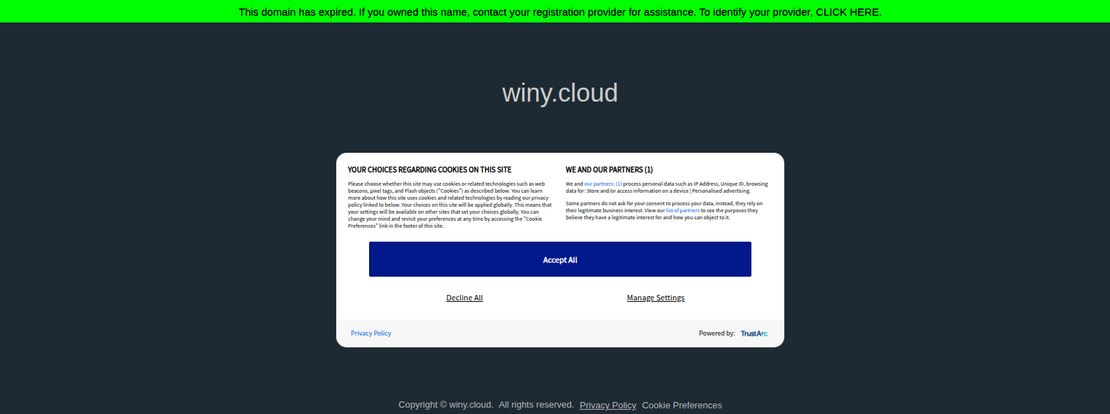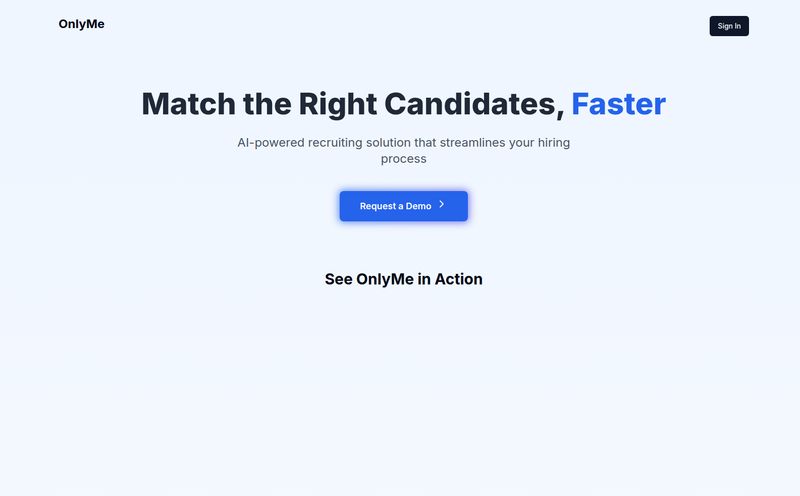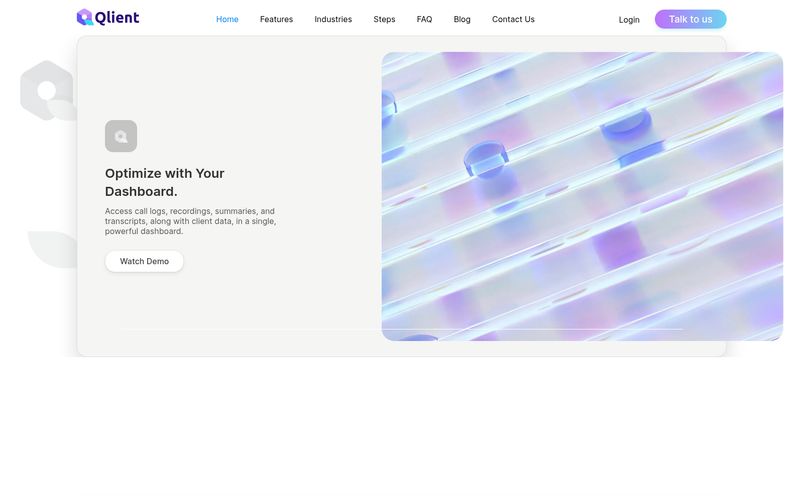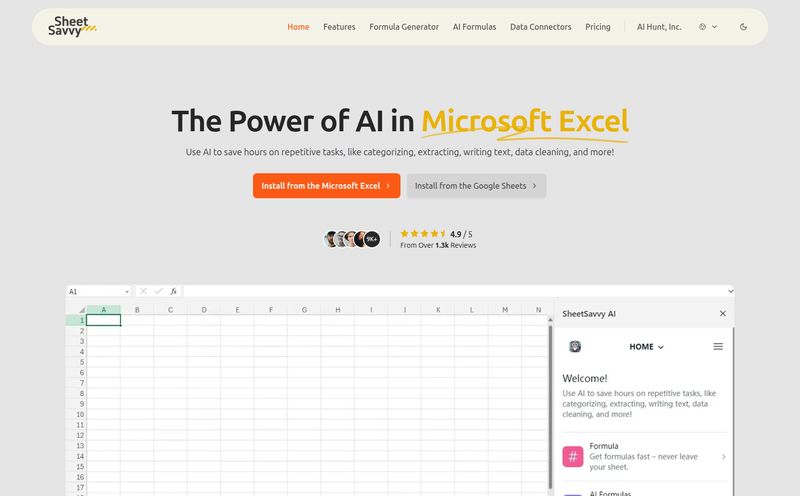We've all been there. Staring at a wine list that looks longer than a CVS receipt, a bead of sweat forming on your brow. The waiter is tapping their foot. Your dinner date is looking at you expectantly. You're supposed to be the one who knows things, right? You end up pointing to the second-cheapest bottle and praying it doesn't taste like fermented grape juice mixed with regret.
It’s a tale as old as time. And that's exactly the problem a clever little tool called Winy Chat promised to solve. Imagine a sommelier in your pocket, ready to give you expert wine pairing advice without the snooty attitude or the hefty price tag. It sounded brilliant. A real game-changer for foodies and casual wine drinkers alike.
But if you go looking for it today... well, you might find what I found: a digital ghost town. An expired domain. It’s a classic tech story, full of promise and mystery. So what was Winy Chat, and what happened to it? Let's pour a glass and investigate.
What Exactly Was Winy Chat Supposed to Be?
At its heart, Winy Chat was designed to be an interactive, AI-powered personal assistant for food and wine. You'd tell it what you were eating—say, a spicy Thai green curry, a rich beef bourguignon, or even just a Tuesday night pizza—and its AI brain would whir into action. Using a massive database, it would suggest the perfect wine to complement your meal.
This wasn’t just about “red with meat, white with fish.” Oh no. The idea was much more sophisticated. It was built to be a multilingual platform, which immediately tells me they had global ambitions. The goal was speed, precision, and personalization. No more guesswork. Just smart, fast recommendations to make your dining experience better. A simple concept, but the tech behind it was pretty exciting.

Visit Winy Chat
The Features That Had Us Hooked
What made the concept of Winy Chat so compelling wasn't just the main idea, but the thoughtful features it was built on. It was more than just a simple lookup tool.
Truly Personalized AI Recommendations
Here's where it got clever. Winy Chat aimed to learn you. It wasn't just about the food. It could take your personal taste profile into account. Do you prefer bold, tannic reds or light, crisp whites? It could also factor in dietary restrictions and the specific occasion. A wine for a wedding anniversary is probably different from a wine for a backyard BBQ, right? This level of customization is what separates a good tool from a great one.
A Deep Well of Wine and Food Knowledge
An AI is only as smart as its data. Winy Chat was reportedly built on an extensive database of wine varietals, regions, vintages, and detailed notes on dishes and ingredients. Think of it like having the entire Wine & Spirit Education Trust (WSET) curriculum digitized and ready to chat. It could understand the difference between a Cabernet Sauvignon from Napa and one from Bordeaux, or why a certain wine works better with a cream sauce versus a tomato-based one. That's some serious firepower.
Context is Everything in Pairing
This was the feature that really caught my eye as an SEO and a foodie. The platform could provide context-specific advice. For example, it could recommend a wine that specifically complements the cooking style or the sauce in your dish. It could even suggest pairings that enhance the experience for certain cultural or seasonal contexts. A crisp Rosé for a summer afternoon? A full-bodied Malbec for a winter feast? The tool was designed to get these nuances right, which is often where the magic of a great pairing lies.
The Good, The Bad, and The Price Tag
No tool is perfect, and from the information available, Winy Chat was no exception. It had some clear strengths and a few predictable hurdles.
On the plus side, the interface was meant to be incredibly easy to use. The whole point was to democratize wine knowledge, not create another complicated app. The multilingual support was a huge advantage, opening it up to a global audience. But the biggest pro was getting that expert-level advice on demand. It's something people pay sommeliers good money for.
The downsides? Well, for one, it needed an internet connection, but that's standard for most apps these days. A more significant point is that its accuracy would live and die by the quality of its AI and its database. A bad recommendation could ruin a meal, so the stakes are surprisingly high. Then there's the price. There was very limited, if any, public information on its pricing model. Was it a subscription? A one-time fee? Ad-supported? The mystery around the cost is often a red flag in the startup world.
So, Where Did Winy.Cloud Go?
This brings us to the elephant in the room. If you navigate to winy.cloud, you're greeted with a stark message: "This domain has expired." It’s the digital equivalent of a “For Lease” sign on a promising new restaurant.
What happened? Honestly, it’s hard to say for sure. This happens all the time in the tech industry. A great idea gets developed, maybe even launched, but it fails to find funding, a sustainable business model, or a large enough audience to keep the lights on. It could have been a passion project that the developers could no longer maintain. Perhaps it was quietly acquired by a larger company for its technology and shut down. Or maybe, just maybe, it'll be back. For now, it remains a ghost—a fascinating case study in a brilliant idea that seems to have vanished into the ether.
Don't Despair: Top Alternatives for the Digital Sommelier
If you were excited by the idea of Winy Chat, don't worry! The dream of having an AI sommelier is very much alive. Here are a few fantastic alternatives that are well-established and incredibly useful:
- Vivino: This is probably the biggest name in the space. You can scan any wine label to get ratings, reviews, and average pricing. It also has a great feature for scanning a restaurant's wine list to see the top-rated options. It's a powerhouse.
- HelloVino: This app focuses heavily on the pairing aspect. You can tell it your meal, and it gives you great recommendations. It also has a wine label scanner and a feature for logging wines you've tried. Very user-friendly.
- Delectable: Similar to Vivino, Delectable allows you to scan labels and keep a diary of your wine experiences. It has a strong social component, allowing you to follow top sommeliers and winemakers to see what they're drinking.
While none of these are quite the dedicated, chat-based AI assistant Winy Chat aimed to be, they offer much of the same functionality and are brilliant tools for any wine lover.
FAQs About Winy Chat and AI Wine Pairing
- What was Winy Chat?
- Winy Chat was an AI-powered web application designed to be a virtual sommelier. Users could input their meal, taste preferences, and occasion to receive personalized wine pairing recommendations from its extensive database.
- Was Winy Chat a free tool?
- There was very little public information about its pricing model. It's unclear if it was intended to be free, subscription-based, or have a one-time purchase fee. This lack of clarity may have been part of its challenge.
- How does AI wine pairing actually work?
- Generally, AI pairing tools use machine learning algorithms and a massive database. The AI analyzes the components of a dish (acidity, fat, spice, sweetness) and matches them with the characteristics of wines (tannins, acidity, body, flavor profile) to find complementary combinations.
- Why did Winy Chat disappear?
- The exact reason isn't public, but its domain `winy.cloud` has expired. This typically happens when a project runs out of funding, fails to find a market, or is abandoned by its developers. It's a common fate for many tech startups.
- What are the best active alternatives to Winy Chat?
- Excellent, well-established wine apps that offer pairing advice and more include Vivino, HelloVino, and Delectable. They are fantastic resources for both new and experienced wine enthusiasts.
- Is AI the future of wine selection?
- It certainly looks like it will play a big part! While nothing can fully replace the human touch of a great sommelier, AI can make wine knowledge more accessible and help people discover new wines confidently. It’s a powerful tool for exploration.
A Final Toast to a Good Idea
So, we're left with the story of Winy Chat—a brilliant idea that, for whatever reason, didn't quite make it across the finish line. It's a reminder that in the fast-paced world of tech, even the best concepts can fizzle out. But the dream it represented is stronger than ever.
The desire to perfectly pair food and wine is about more than just taste; it's about elevating an experience, creating a memory, and sharing a moment. And while Winy Chat may be a ghost for now, the tools it inspired and the problem it tried to solve are very much alive and well. So next time you're stuck on a wine list, pull out one of the alternatives. Raise a glass to technology, and to the endless, delicious pursuit of the perfect pairing. Cheers.



